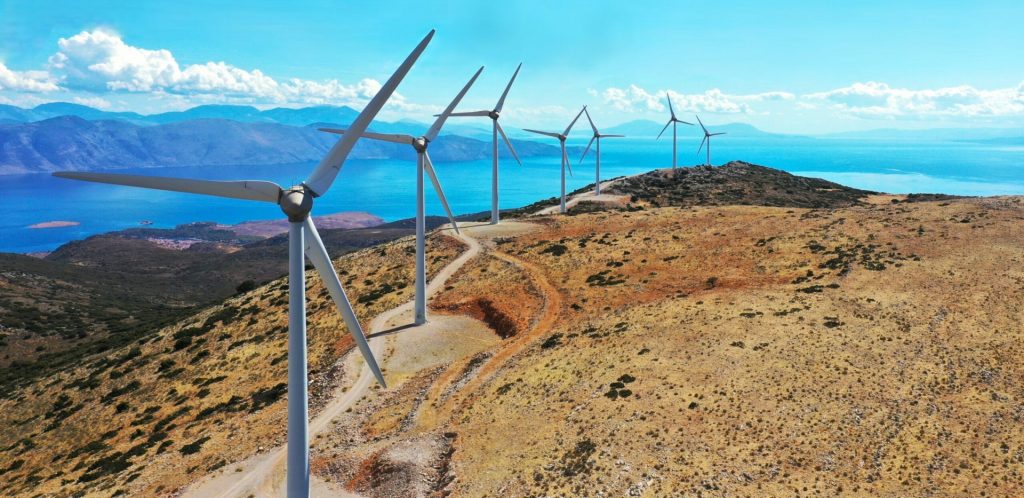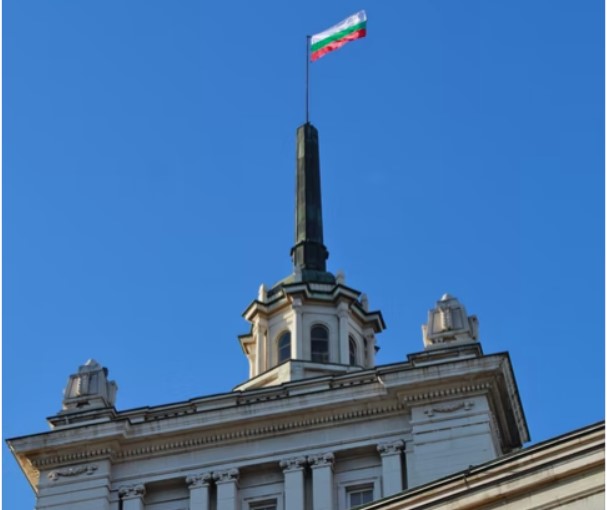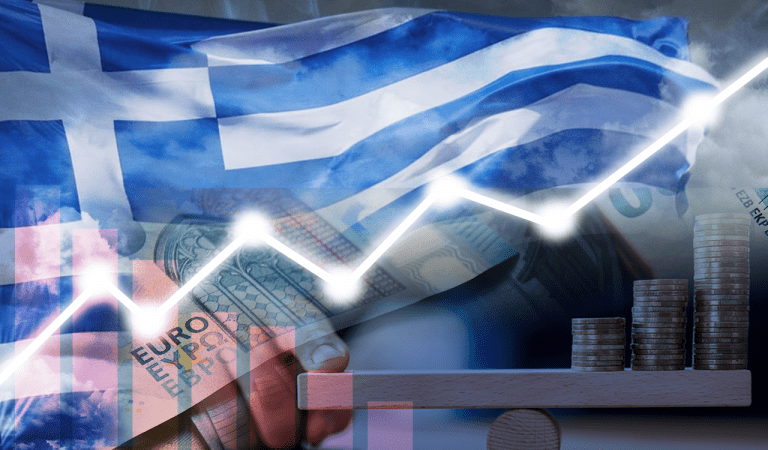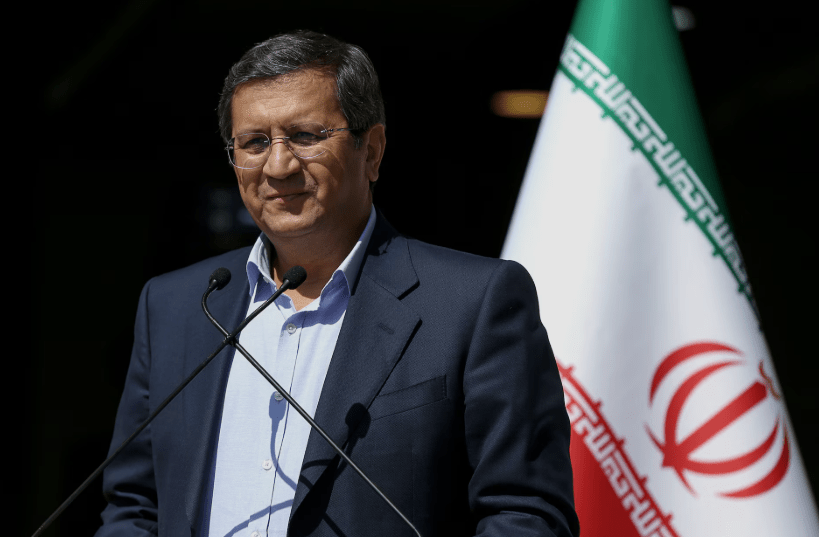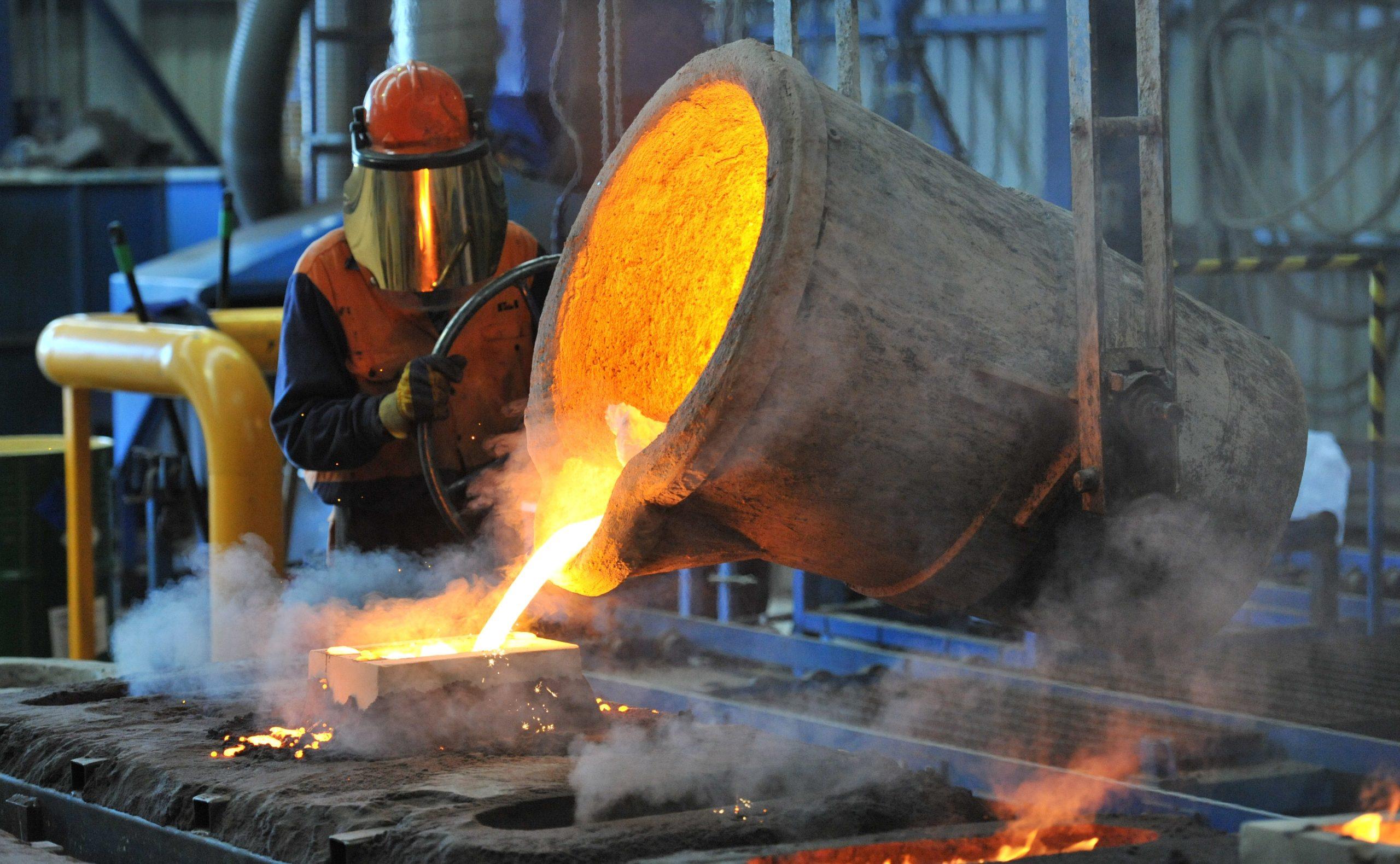The year 2022 was a milestone for the Motor Oil refinery group and its top executive, Vardis Vardinogiannis, who at the time took the opportunity to send his special message on the occasion of the influential Group’s 50th anniversary.
Within the pages of a special commemorative album Vardis Vardinogiannis took stock of the last half century of Motor Oil’s operation, reminisces and charts the Group’s course for the next 50 years.
The proud Cretan native and Hellenic Navy officer (1955-1967), who passed away on Tuesday, November 12, assumed Motor Oil’s helm in 1973, when the visionary force behind the construction of the Corinth-area refinery, his older brother Nikos Vardinogiannis, suddenly passed away.
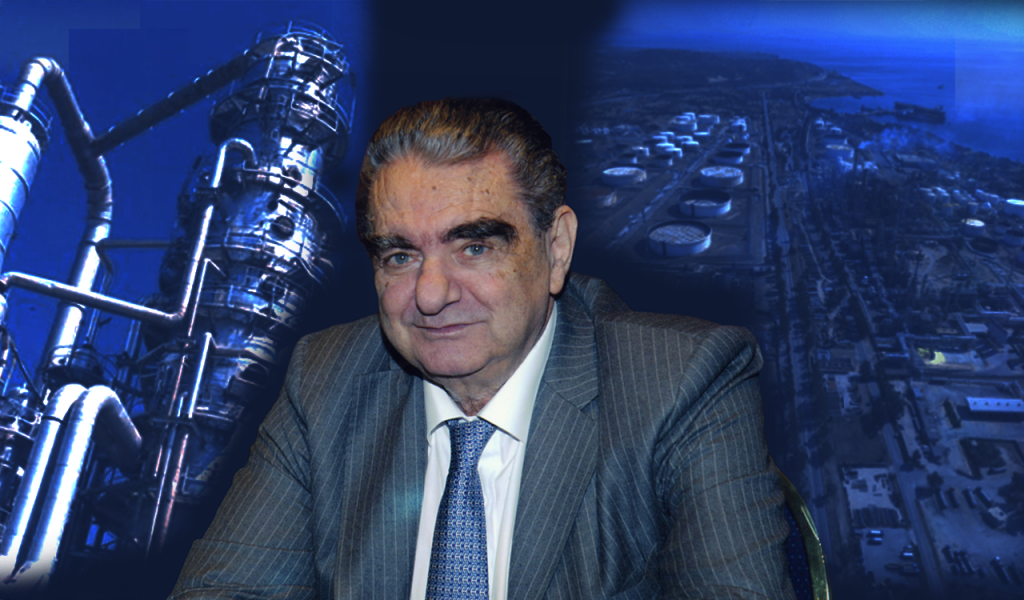
Vardis Vardinogiannis: Motor Oil continues its journey, stronger, like a new ship
Motor Oil’s corporate and industrial journey over the past half century was also inextricably linked with the Greek economy’s course.
Vardis Vardinogiannis was confident of the group’s future and its impact on the country’s growth, writing, characteristically, in the commemorate album, that it will “continue stronger, like a new ship.”
“Drawing on the principles of the Hellenic Navy, which I served as an officer, and which are deeply entrenched in me, I know that on the ship’s bridge you always look forward. As far as your gaze reaches, perhaps even further, drawing on knowledge, experience, insight, and with faith and commitment towards the goal,” Vardinogiannis wrote in the penultimate paragraph of his message in the album commemorating Motor Oil’s half century of operation, issued in 2022.
“Today, I am proud to see Motor Oil continuing the journey it started 50 years ago; bigger, more modern and stronger, like a brand new ship, which knows how to evolve and respond to the challenges and demands of the times – and constantly with an eye to the future and always preserving the precious heritage and legacy of yesterday, with a ‘full speed ahead’ for tomorrow’,” Vardinogiannis concluded.
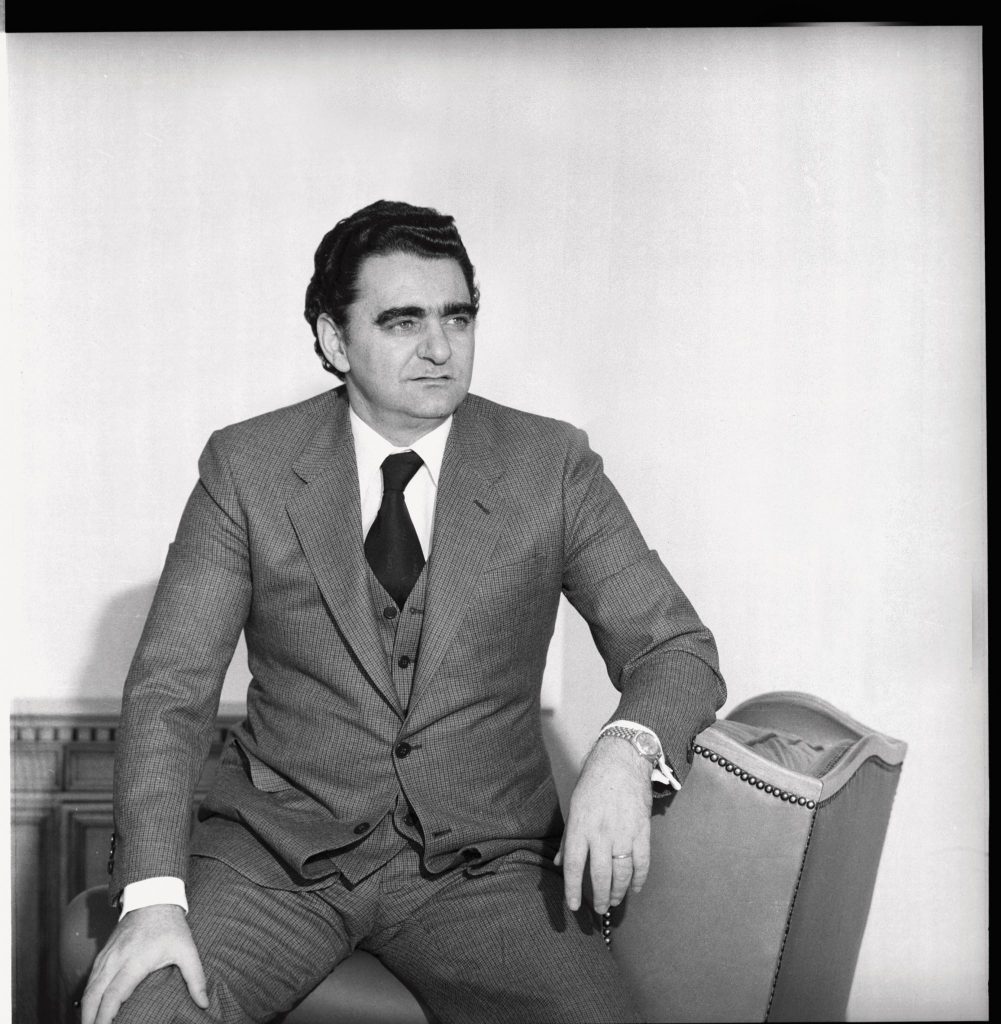
’50 years that determined my life…’
Vardis Vardinogiannis, who served as the president of Motor Oil for 51 years (1973 – 2024), detailed the course of Group and his own personal, and stellar business career.
Among others, he stressed that 2022 “was a very significant milestone in the Group’s historic course.”
He described the Group’s half century as “50 years of struggles and agony, hard work, and toil with adversity – achievements, difficulties, and successes. Fifty years of growth and development, but always with faith in the goals set and achieved; goals made ever loftier, higher, which Motor Oil has always set for itself.”
Devotion towards set goals
In his message for the Group’s 50-year anniversary, Vardis Vardinogiannis set out one and only goal for the Group, which was built by his family:
“The previous milestones in our history immediately come to mind. I look back at all the steps, from the first to the present day, all the key milestones during this long and creative journey. In a multifarious course full of all types of challenges, and always with faith and dedication to the goal: to create, to strive, to move forward for the company; for ourselves, for our families, for our country,” Vardis Vardinogiannis underlined, while at the same time conveying his own message about the contribution that all Greeks must make towards the country’s progress.
A philosophy of life and the values of entrepreneurship
In a brief account of Motor Oil’s 50 years of operation, Vardis Vardinogiannis doesn’t forget from where he started from, the difficult years he experienced, yet above all he reveals his life’s philosophy and the principles that defined his path; principles which he passed on to the Group and which he indelibly fused with his business activity.
“Naturally, nothing was taken for granted, nothing was given away and nothing was easily won, but only with vision, hard work, team effort and with many sacrifices,” as he points out and continues:
“We all, the people of Motor Oil, have always perceived success through the values for which the Group stands for, and the spirit that permeates the Group – with a philosophy of life that is connected to a business philosophy. But above all, with a non-negotiable ethic, because since its creation Motor Oil has followed and served two fundamental principles: The first defines that the company is and operates as a big family, with ties of loyalty, solidarity and cooperation, ties that are deeply human among its members. The second principle is that every success by Motor Oil supports and strengthens the country’s economy and contributes to society and our nation.”
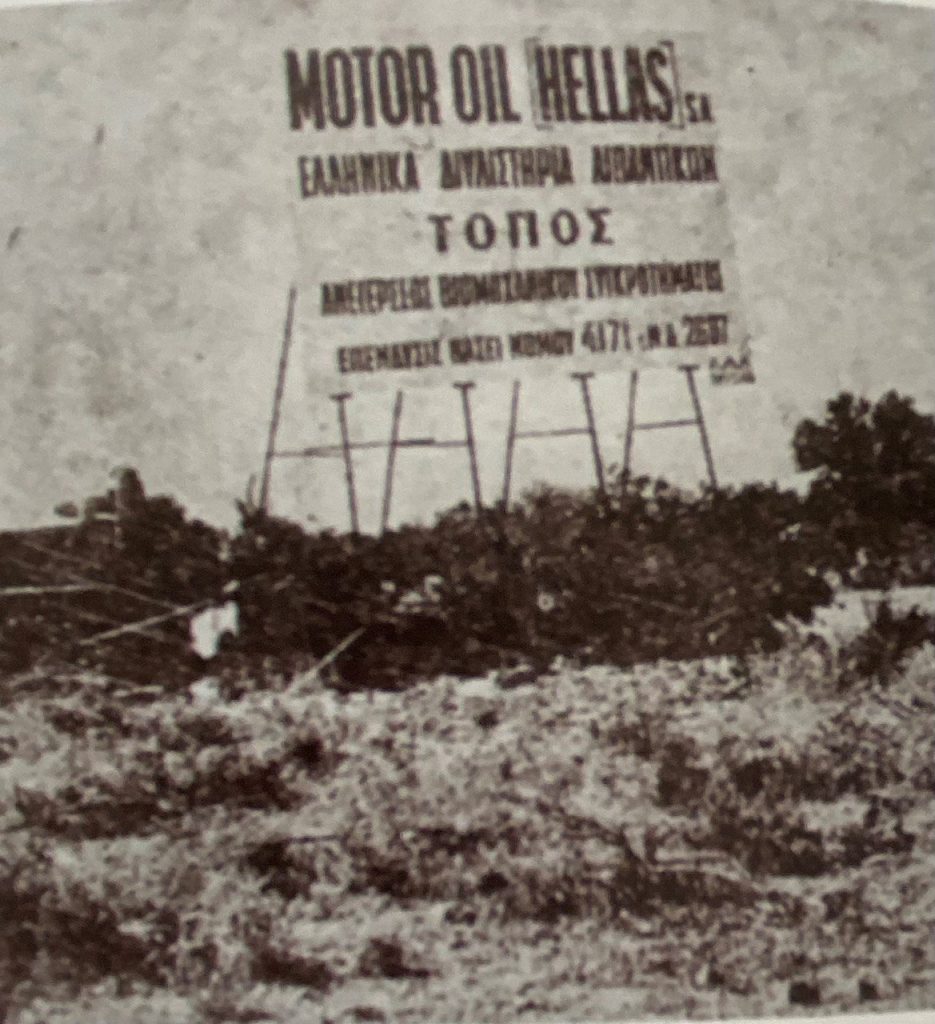
A sign, erected in 1970, declares that the site will host the future Motor Oil refinery, at the Aghii Theodori site, due west of the Athens-Piraeus area, in Corinth prefecture.
Motor Oil begins operation in 1972
Ten milestones stand out in Motor Oil’s course over 52 years. Several of these milestones are intimately linked with the course of the Greek economy as well.
The first milestone, of course, is the commencement of the Corinth-area refinery’s operation.
Vardis Vardinogiannis remembered this first and most significant milestone, noting:
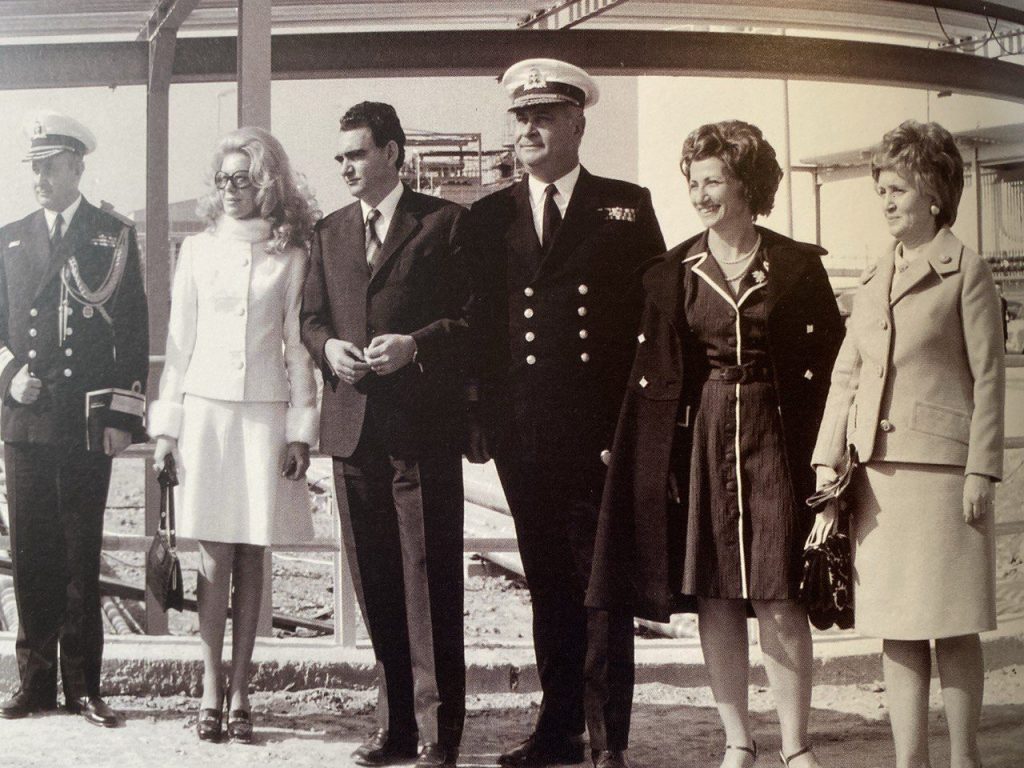
Vardis Vardinogiannis, third from left, with his wife, Marianna, second from left, poses with Hellenic Navy Vice-Admirals Theodoros Manolopoulos, third from right, and Aristidis Giannopoulos, left, along with their wives, at the newly inaugurated Motor Oil refinery, Nov. 11, 1972.
“It is with emotion that I think back to November 1972, the beginning of Motor Oil’s operations, a unit for lubricants and refining crude oil that was to become a state-of-the-art energy giant with a leading position in Greece and Europe.”
It was on Nov. 11, 1972, that an inauguration ceremony for the new Motor Oil refinery at the Aghii Theodori site in Corinth prefecture took place amid an official but festive atmosphere before more than 2,000 guests.
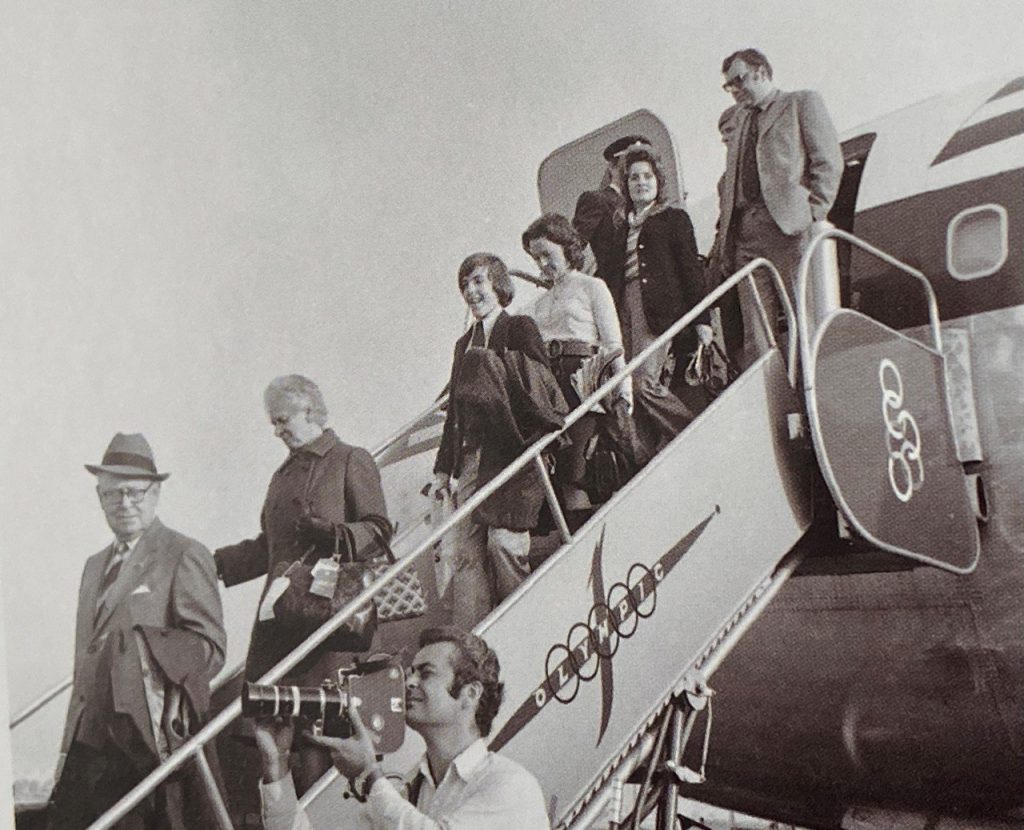
VIP guests invited from around the world arrive in Athens aboard a specially chartered Olympic Airlines plane in order to attend the inauguration of the Motor Oil refinery on Nov. 11, 1972.
The refinery’s extravagant inauguration is attended by state officials, foreign ambassadors, bank presidents, domestic business leaders, as well as some 150 representatives of multinationals and global oil giants. Many of the latter were flown in from New York and London to Athens by aircraft chartered by Motor Oil specifically for the occasion.
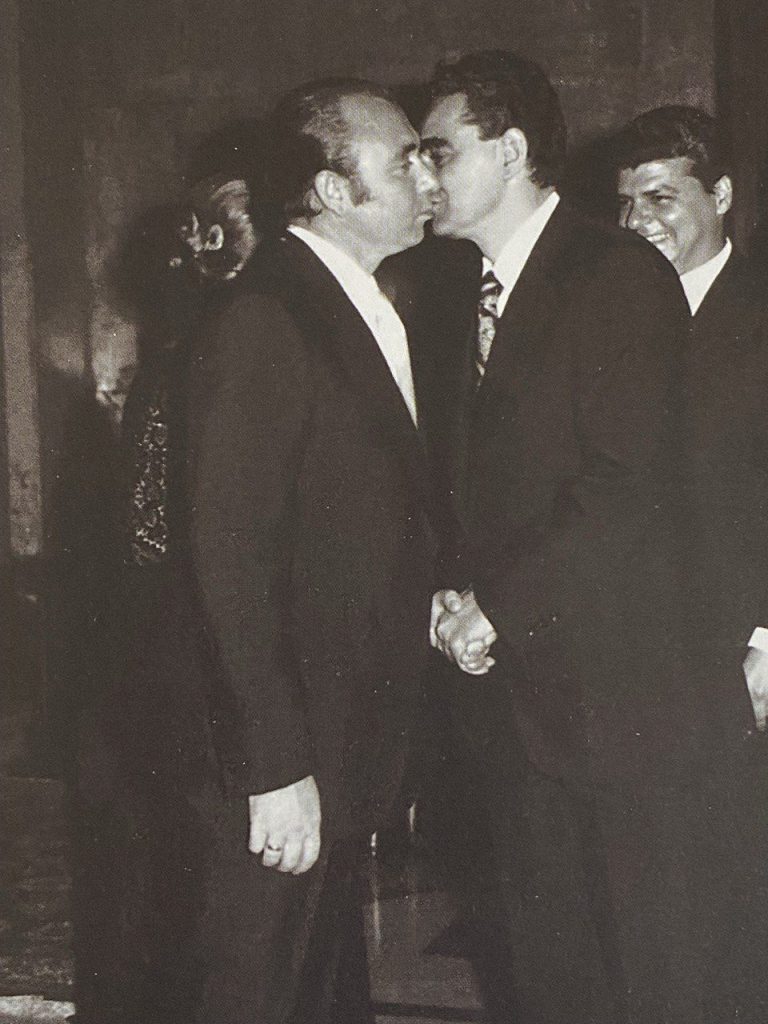
Nikos Vardinogiannis, left, greets his younger brother, Vardis Vardinogiannis, at the Grande Bretagne Hotel in central Athens on the evening of Nov. 11, 1972, on the day that the Motor Oil refinery was inaugurated.
“It’s a pioneering industrial facility, which in many ways belongs to the future,” is the description written in Motor Oil’s commemorative album, followed by a reverent mention of the Group’s founder:
“After all, the future was what Nikos I. Vardinogiannis, the founder of Motor Oil, was attempting to conquer. If behind every success story there’s always a bold visionary, Nikos Vardinogiannis could be the ideal model.”
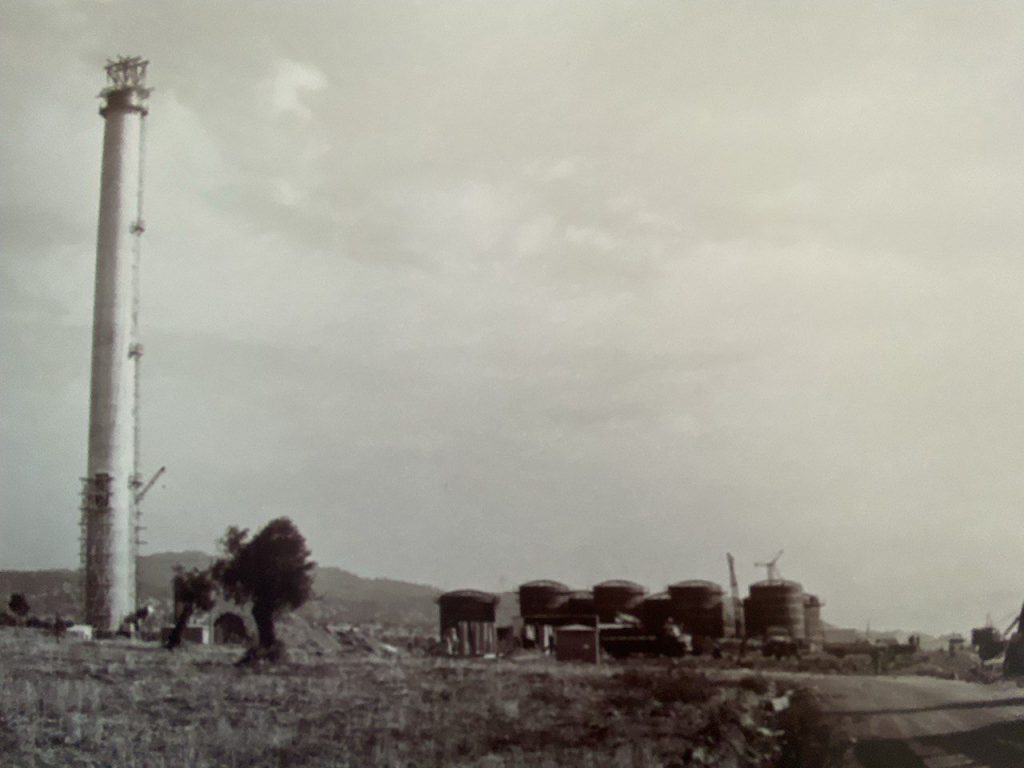
A stock stack is seen at the under-construction refinery at the Aghii Theodori site, 1971.
The choice for the refinery’s location was anything but random. The specific area, covering a total area of 200 hectares at the Aghii Theodori site, has a number of advantages, such as its proximity to Athens, the ability of vessels with a large draught to dock in the waters off the facility and its overall geographical location, allowing the strategic option of selecting various types of crude oil suppliers from different countries of origin.
The refinery’s capacity reaches two million tons of product annually, with the facilities comprised of two many complexes:
– The crude oil refining complex for the production of LPG, naphtha, diesel and fuel oil.
– The mineral oil complex for the production of naphtha, bitumen and paraffin.
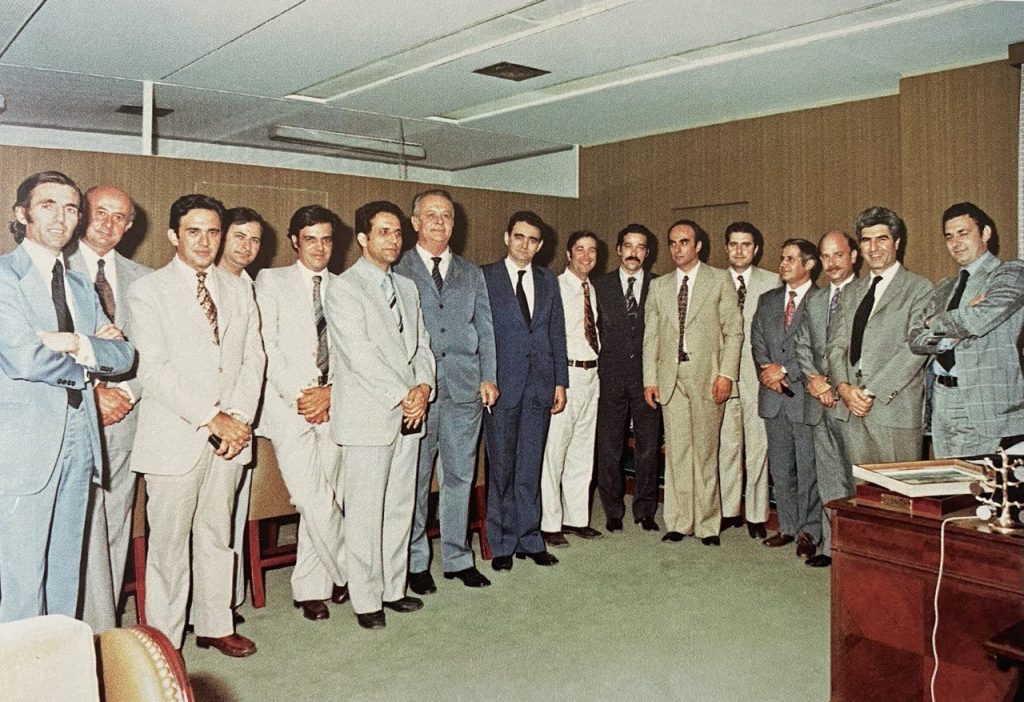
Motor Oil president and CEO Vardis Vardinogiannis, center, amid top executives and recently forced-retired Hellenic Navy officers, who were hired by the company at the time. Giorgos Vardinogiannis, his younger brother, is at the far left, while another younger brother, Thodoros, is at the far right.
Vardis Vardinogiannis assumes the helm of Motor Oil in 1973
“The summer of 1973 was a dark page in the company’s history, as an unimaginably tragic and completely unexpected event affects the Motor Oil family,” as it’s described in the Group’s 50-year commemorative album.
“On July 2, 1973, quite suddenly, the company’s founder and chairman of the board of directors, Nikos I. Vardinogiannis, passes away. He was only 42 years old.”
Vardis Vardinogiannis, who had been in the family business from the beginning and without interruption, assumes the helm of Motor Oil. It is Vardis Vardinogiannis who is called upon to steer the company into a “safe harbor”, protecting it from the effects of the global oil crisis, which erupts in October 1973.
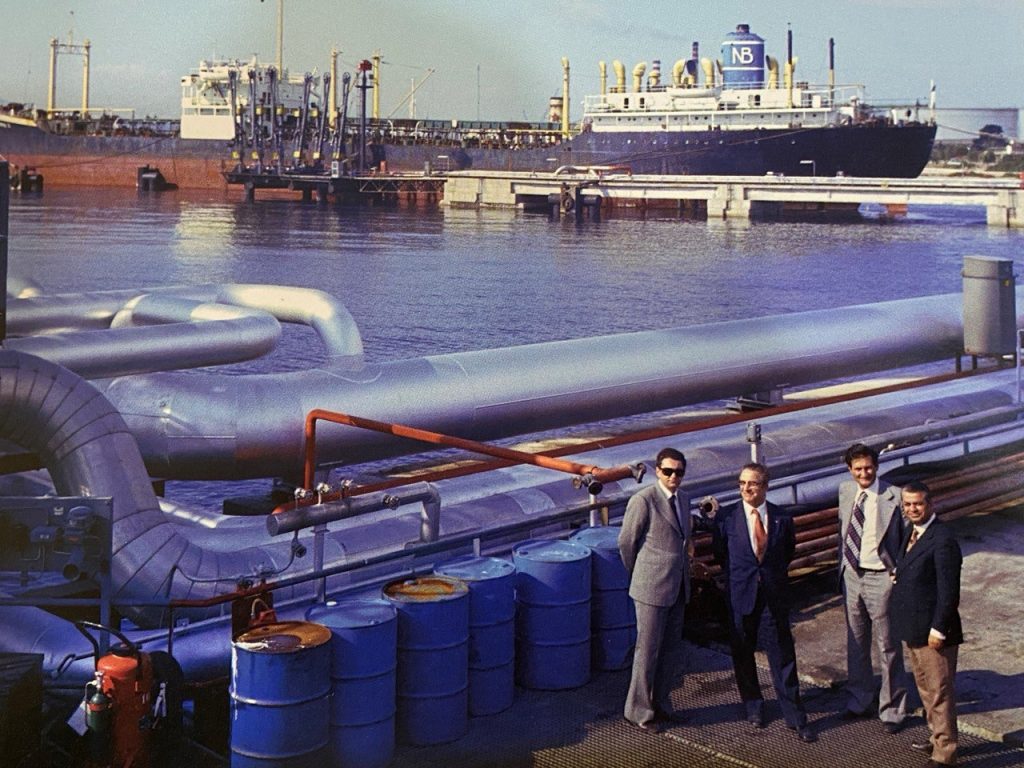
Motor Oil president and CEO Vardis Vardinogiannis gives a guided tour of the refinery’s facilities to then industry minister Konstantinos Konofagos in 1975.
1973-1974: The oil crisis and the decoupling of the drachma from the US dollar
In 1973 Vardis Vardinogiannis is appointed chairman of Motor Oil. That same year witnesses an intense turbulence in the global oil market.
The rapid expansion of demand, on the one hand, and the limited supply of crude oil, on the other, in tandem with the sharp fluctuations in exchange rates cause the price of crude oil to soar.
The situation is further aggravated by the start of yet another round of hostilities between several Arab countries and Israel. The fourth Arab-Israeli war, or the War of Yom Kippur, renders the prospect of a crude oil embargo against certain Western states inevitable. The price of crude oil increases fivefold by 1974.
It is at this point that Vardis Vardinogiannis and the management of Motor Oil manage to limit the Group’s losses, thanks to a timely and correct assessment of the international situation.
Appropriate steps under Vardinogiannis’ management and a strategy entailed in the uninterrupted crude supply through existing agreements as well as from the free market guarantee the smooth supply for the refinery, despite the restrictions in quantity imposed by the oil-producing states.
In 1974 Motor Oil is faced with a negative business environment, both domestically and internationally.
It is at this point that the drachma is decoupled from the US dollar, which, combined with soaring crude oil prices, creates recessionary conditions and inflationary pressure.
At the same time, the crisis in the shipping sector is exerting its own negative influence on the general business climate.
Nevertheless, Vardis Vardinogiannis and Motor Oil’s management press on with the Group’s growth and development plan.
In 1975 the construction of a new crude oil complex is completed. Motor Oil’s refining capacity rises to 7 million tons and the new complex now produces naphtha, aviation fuel, kerosene, diesel and fuel oil, LPG and elemental sulphur as a by-product.
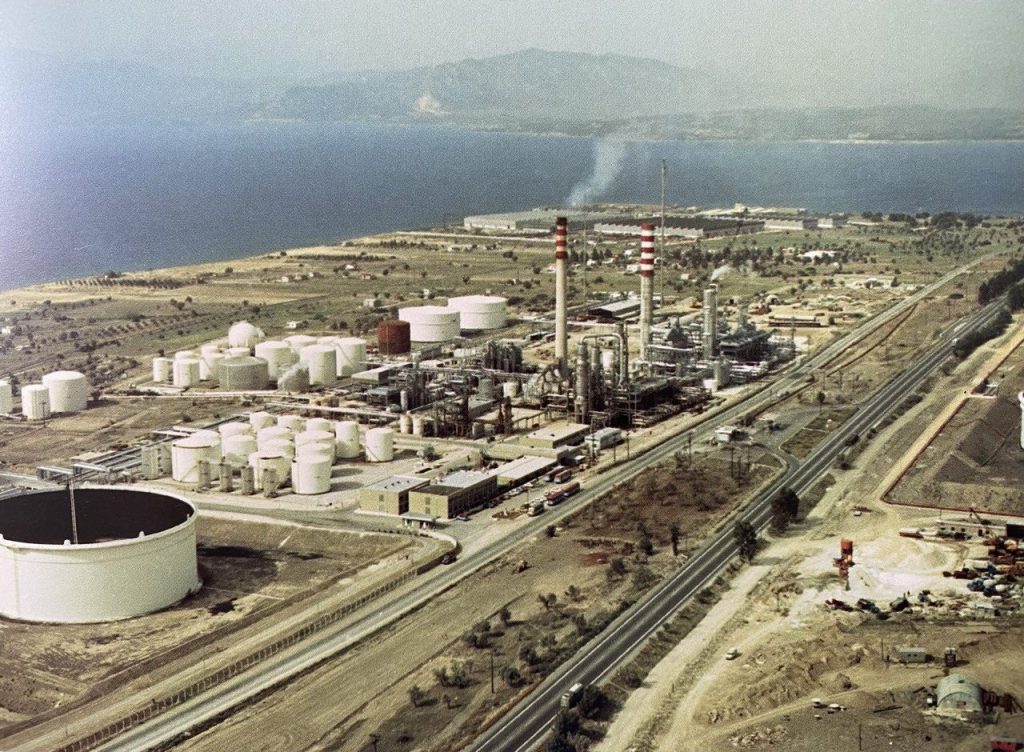
An aerial view of the Aghii Theodorii refinery in 1975.
Gasoline production begins in 1976
In his message in the commemorative album, Vardis Vardinogiannis describes the beginning of gasoline production by the refinery as another milestone for the Group.
“This half century of Motor Oil’s history is a collection of pivotal moments. For the oldest among us, when we look at the old photos we return in time, reliving as if in that time again, the thrill and excitement of the beginning in November 1972. Then, the excitement of the transition from lubricants to fuels, watching the first liter of gasoline ever produced by the refinery,” Vardinogiannis recounts in his 2022 anniversary message.
In 1976, Vardis Vardinogiannis, now chairman and CEO of Motor Oil, steers the Group towards a realignment in its investment strategy.
This was deemed necessary in view of the imminent change in the Greek state’s oil policy with regard to the supply of petroleum products to the domestic market and the impending abolition of restrictions, which prevented Motor Oil from supplying the state and other oil companies in Greece.
As a result, a new expansion of facilities is decided, with the construction of a heavy naphtha catalytic unit for the production of 400,000 metric tons of gasoline annually set in motion. This plant was completed two years later and commissioned in 1978.
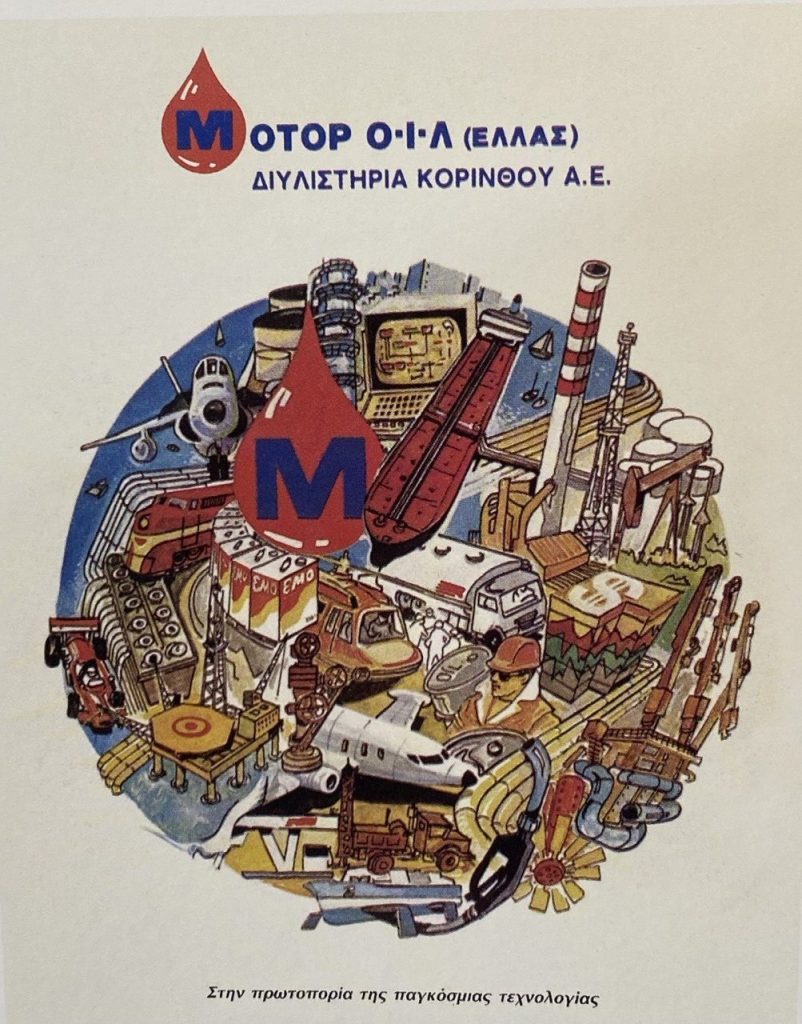
A Motor Oil print ad in 1985.
Greece’s entry into the EEC in 1981
After a long period of pre-accession negotiations, Greece became an equal member of the EEC on Jan. 1, 1981.
Vardis Vardinogiannis has already prepared Motor Oil for the new era dawning for the Greek economy.
Greece’s accession to the EEC is a historic milestone for the country’s course, with a serious impact on its economic and investment activity.
With Vardis Vardinogiannis at the helm of the Group it has succeeded in coping with the adverse conditions on the international market without unnecessary losses.
Motor Oil has the necessary prospects and potential to proceed unhindered with its investment planning and to significantly expand its penetration of the Greek and international oil and lubricants market.
The first production of unleaded gasoline in 1982
A year later, Vardis Vardinogiannis helps align Motor Oil’s strategy with European and international trends by interpreting developments over the long term. The same year, in 1982, a new sulphur recovery and separation unit is installed in the catalytic cracking complex, a necessary element in the production of high-octane gasoline.
With this large-scale investment, Motor Oil makes a dynamic innovation, as only one such plant existed in Europe at the time.
With the initiative, Vardinogiannis and Motor Oil succeed in ensuring that the group can supply the Greek market with unleaded gasoline of high specifications, in line with international standards. This superior quality gasoline (petrol) is produced at the refinery and is destined for European and international markets.
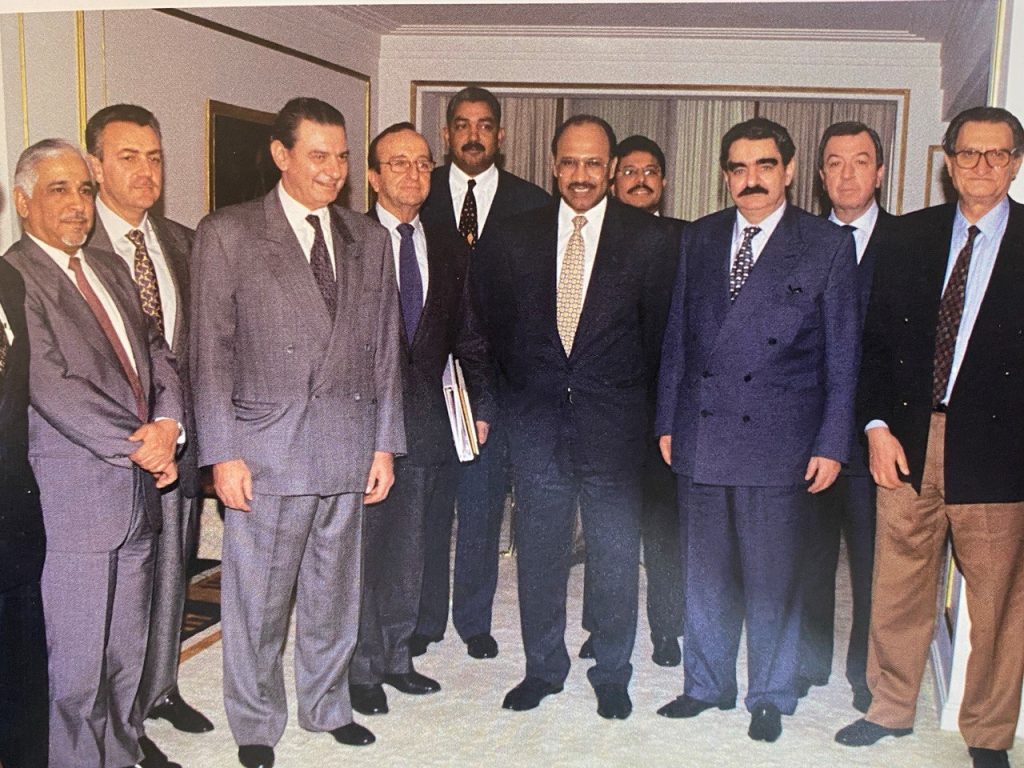
Members of a new board of directors of the company after an agreement between Motor Oil and Saudi Aramco, on March 15, 1996.
1996 and an agreement with Saudi Aramco
Motor Oil continues to grow rapidly, and in 1996 Vardis Vardinogiannis enters into a landmark business agreement that will establish the Greece-based Group internationally.
On March 14, 1996, an agreement is signed in London for a joint venture between the Vardinogiannis Group and the Saudi Aramco Group, the largest oil-producing conglomerate in the world.
The significance of the agreement is marked by the presence of Saudi Arabia’s Minister of Petroleum, Ali Al Naimi, at the high-profile signing ceremony.
Under the agreement, Motor Oil Holdings SA (controlled by the Vardinogiannis family) and Aramco Overseas Company B.V. (a subsidiary of Saudi Aramco) are now established as shareholders of Motor Oil, with a 50-percent stake each.
Aramco’s participation in Motor Oil’s share capital is one of the largest foreign investments ever made in Greece.
The two groups agree that Motor Oil’s organic growth is a key priority, while the Greek company is guaranteed a timely and uninterrupted supply of crude oil.
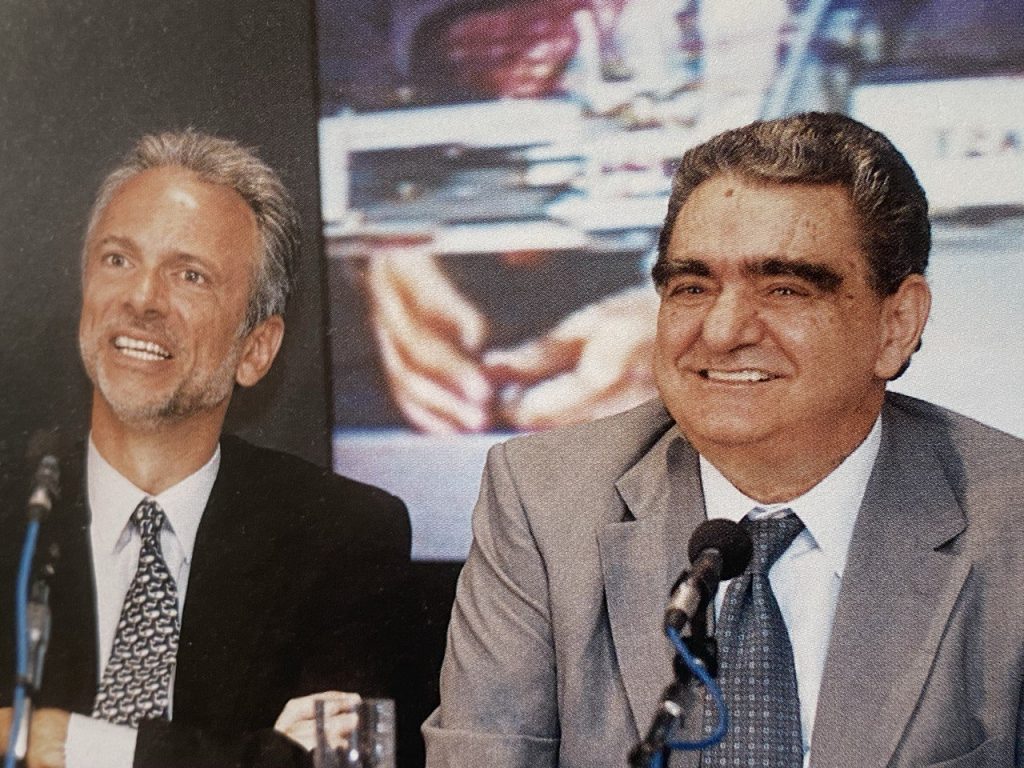
Motor Oil president and CEO Vardis Vardinogiannis, right, with then deputy CEO Petros Tzannetakis, in 2001.
A listing on the Athens Stock Exchange in 2001
Another milestone for Motor Oil is its listing on the Athens Stock Exchange.
Vardis Vardinogiannis manages and approves of this investment decision, and between July 10 and 13, 2001 the public listing takes place.
The management of the Athens Stock Exchange decides to list 105,507,600 existing shares on the big board, plus 5,275,380 new shares from a share capital increase.
On Aug. 6, 2001, trading of the shares begins, and Motor Oil’s cash reserves are boosted by 50 million euros.
A year later, in 2002, Motor Oil acquires 100 percent of the shares of Avin Oil for 37.5 million euros.
In 2005, Vardis Vardinogiannis and the Motor Oil Group agree to acquire the 50-percent stake held by Saudi Aramco, giving the Vardinogiannis Group control of 67.4 percent of Motor Oil on Nov. 22, 2005.
In 2006 he disposes, through a private placement, of 5.9 percent of shares, increasing the free float to 38.5 percent.
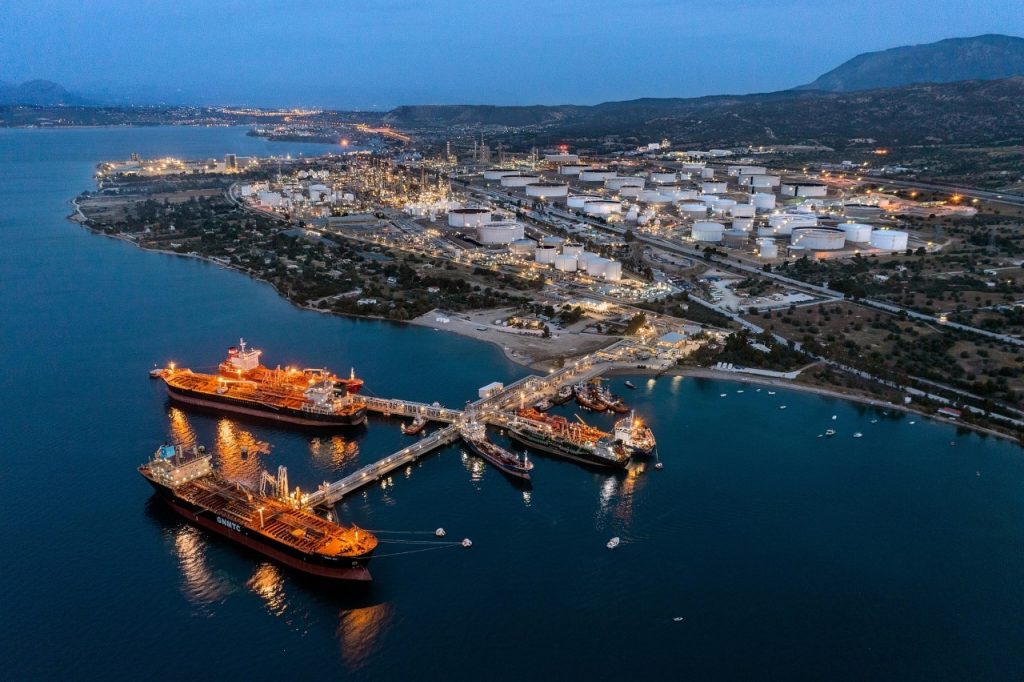
The Motor Oil facilities in the present day.
The economic crisis in Greece
The 2002-2011 period is a time of particular importance for the Motor Oil Group.
During this decade, Vardis Vardinogiannis and the Group’s management proceed with extensive infrastructure investments and enter into a strategic partnership with Shell.
However, the second half of this period witnesses the beginning of a punishing economic crisis that hits Greece, with serious repercussion affecting the country’s society.
Vardis Vardinogiannis and Motor Oil remain committed to the Group’s principles and devotion to setting and meeting goals, assuming an unofficial role as a corporate model for dealing with the now generalized domestic crisis.
Despite the necessary readjustment to its plans, Motor Oil manages to fend off negative effects in the overall market environment and to make significant strides in both technological and business terms.
A ‘green strategy’ in 2012-2022
In the 21st century Vardis Vardinogiannis continues to inspire with his leadership in Motor Oil Group’s fifth decade of existence.
Foresight and prudence are the main characteristics of the management now exercised by his son, Ioannis V. Vardinogiannis, who holds the positions of Vice Chairman of the Board and, since January 2021, serves as the CEO of the company.
Motor Oil’s fifth decade of operations is marked by Greece’s exit from the economic crisis and the company’s inauguration of its “green strategy”.
The Group is constantly breaking production and sales records. In 2019, sales reached 15.5 million tons, when in 2019 they reached 9.4 million tons.
Motor Oil’s management has also announced a four-billion-euro investment plan, aimed at the Group’s “green” and “digital transition”.
Major milestones in Motor Oil’s history were also posted in 2021 – 2022.
The company MORE Energy is founded, focusing on renewable energy sources and “clean energy”, while in 2022 Motor Oil acquires almost 30 percent of Ellaktor, and at the same time, 75 percent of the latter construction group’s renewable energy sources. That deal reached one billion euros.
In 2022, Motor Oil celebrates its 50th anniversary and unveils its investment plan of four billion euros until 2030, in order to proceed with a “green transition”.
MORE Energy is the main vehicle for this new challenge, while Motor Oil’s plans include its digital transformation, entering the electrification sector with 1,000 charging points by the end of 2023 and 2,000 such points in five years.
In June 2024, Motor Oil, with Vardis Vardinogiannis as the Group chairman, acquires Helector S.A. from Ellaktor Group, marking its entry into the waste management sector.
